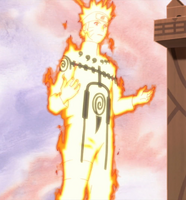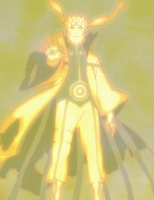m (Undo revision 805429 by Itachi7000 (talk)) |
KazeKitsune (talk | contribs) m (→Trivia) Tag: sourceedit |
||
| (21 intermediate revisions by 12 users not shown) | |||
| Line 11: | Line 11: | ||
|debut shippuden=Yes |
|debut shippuden=Yes |
||
|game debut=Naruto Shippūden: Ultimate Ninja Storm 3 |
|game debut=Naruto Shippūden: Ultimate Ninja Storm 3 |
||
| + | |movie debut=Road to Ninja: Naruto the Movie |
||
| − | |jutsu media=Anime, Manga, Game |
+ | |jutsu media=Anime, Manga, Game, Movie |
}} |
}} |
||
| − | When Naruto first obtained [[Nine-Tails Chakra Mode]], his [[Eight Trigrams Sealing Style|previous seal]]'s outward appearance had changed into a shape of |
+ | When Naruto first obtained [[Nine-Tails Chakra Mode]], his [[Eight Trigrams Sealing Style|previous seal]]'s outward appearance had changed into a shape of a [[wikipedia:magatama|magatama]], along with a swirl design that resembled [[Uzushiogakure]]'s symbol.<ref>Chapter 499, pages 11-12</ref> |
| − | By using the seal's key, he can create several massive interlocking torii that can even immobilise and imprison [[Kurama]] with ease. Naruto then isolated Kurama's chakra in another part of him away from the |
+ | By using the seal's key, he can create several massive interlocking torii that can even immobilise and imprison [[Kurama]] with ease. Naruto then isolated Kurama's chakra in another part of him away from the fox itself in between four torii, so he could access it freely.<ref>Chapter 505, page 7</ref> It was later revealed that Kurama isn't always bound by the torii and has freedom of movement behind its cage, but Naruto can enter the cage without breaking the seal and still manipulate the torii to immobilise the fox if he wants.<ref>Chapter 538, pages 17-18</ref> |
| − | {{-}} |
+ | {{-L}} |
| − | <gallery orientation="none" position="center" columns="3" widths="200" spacing="small"> |
+ | <gallery orientation="none" position="center" columns="3" widths="200" spacing="small" hideaddbutton=true> |
Kyubi Chakra Mode.png|The seal's outward appearance on the Nine-Tails Chakra Mode's shroud. |
Kyubi Chakra Mode.png|The seal's outward appearance on the Nine-Tails Chakra Mode's shroud. |
||
| − | Naruto |
+ | Naruto's TBM1.png|The seal's outward appearance on the Tailed Beast Mode's shroud. |
</gallery> |
</gallery> |
||
| + | {{-}} |
||
== Trivia == |
== Trivia == |
||
| − | * A {{translation|[[ |
+ | * A {{translation|[[wikipedia:torii|torii]]|鳥居|lit meaning=bird perch}} is a traditional Japanese gate most commonly found at Buddhist temples and Shintō shrines, where it symbolically marks the entrance to a sacred area. Torii were traditionally made from wood or stone, but today they can also be made of reinforced concrete, copper, stainless steel, or other materials. They are usually either unpainted or painted vermilion with a black upper lintel. Located in Kyoto, [[wikipedia:Fushimi Inari-taisha|Fushimi Inari-taisha]], which is the head shrine of the Shintō [[wikipedia:kami|kami]] [[wikipedia:Inari Ōkami|Inari]], is very well known to hold thousands of such torii. |
| − | * When this seal was made, Kurama made an allusion to the [[Sage of |
+ | * When this seal was made, Kurama made an allusion to the [[Sage of Six Paths]], but never finished its statement.<ref>Chapter 499, page 15</ref> |
== See Also == |
== See Also == |
||
Revision as of 14:40, 6 March 2016
When Naruto first obtained Nine-Tails Chakra Mode, his previous seal's outward appearance had changed into a shape of a magatama, along with a swirl design that resembled Uzushiogakure's symbol.[1]
By using the seal's key, he can create several massive interlocking torii that can even immobilise and imprison Kurama with ease. Naruto then isolated Kurama's chakra in another part of him away from the fox itself in between four torii, so he could access it freely.[2] It was later revealed that Kurama isn't always bound by the torii and has freedom of movement behind its cage, but Naruto can enter the cage without breaking the seal and still manipulate the torii to immobilise the fox if he wants.[3]
Trivia
- A torii (鳥居, literally meaning: bird perch) is a traditional Japanese gate most commonly found at Buddhist temples and Shintō shrines, where it symbolically marks the entrance to a sacred area. Torii were traditionally made from wood or stone, but today they can also be made of reinforced concrete, copper, stainless steel, or other materials. They are usually either unpainted or painted vermilion with a black upper lintel. Located in Kyoto, Fushimi Inari-taisha, which is the head shrine of the Shintō kami Inari, is very well known to hold thousands of such torii.
- When this seal was made, Kurama made an allusion to the Sage of Six Paths, but never finished its statement.[4]



